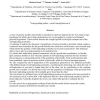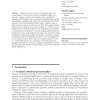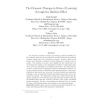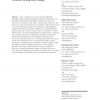ALIFE
2006
13 years 11 months ago
2006
This paper investigates the evolution of autonomous agents that solve a memorydependent counting task. Two types of neurocontrollers are evolved: networks of McCulloch-Pitts neuro...
ALIFE
2006
13 years 11 months ago
2006
ALIFE
2006
13 years 11 months ago
2006
An evolutionary system that supports the interaction of neutral and adaptive mutations is investigated. Experimental results on a Boolean function and needle-in-haystack problems s...
ALIFE
2007
13 years 11 months ago
2007
ALIFE
2007
13 years 11 months ago
2007
A class of generic models of protocells is introduced, which are inspired by the “Los Alamos bug” is but which, due to their abstraction level, can be applied to a wider set o...
ALIFE
2007
13 years 11 months ago
2007
Animals use diverse forms of communication, from sound signals to body postures. Recent ethological studies have reported a unique syntactic communication of a songbird, the Bengal...
ALIFE
2007
13 years 11 months ago
2007
ALIFE
2007
13 years 11 months ago
2007
This review essay surveys recent literature in the history of science, literary theory, anthropology, and art criticism dedicated to exploring how the artificial life enterprise ha...
ALIFE
2007
13 years 11 months ago
2007
Cross-reactions and other systematic difficulties generated by the coupling of functional chemical subsystems pose the largest challenge for assembling a viable protocell in the la...
ALIFE
2007
13 years 11 months ago
2007
Robert Rosen’s central theorem states that organisms are fundamentally different to machines, mainly because they are ‘‘closed with respect to effcient causation.’’ The p...




